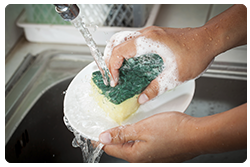There is good reason why we need to keep a clean home, as well as adopting good basic
 hygiene habits. We can reduce our chances of illness & sick days associated with the spread of germs and can also significantly cut down the allergens which exacerbate conditions such as asthma, eczema, coughing, sneezing and sore throats. According to a World Health Organization report, about 40% of reported food related outbreaks of infection in Europe occur in the home.
hygiene habits. We can reduce our chances of illness & sick days associated with the spread of germs and can also significantly cut down the allergens which exacerbate conditions such as asthma, eczema, coughing, sneezing and sore throats. According to a World Health Organization report, about 40% of reported food related outbreaks of infection in Europe occur in the home.
What is dust?
Plant pollen, human & animal hair, textile fibres, paper fibres, minerals from outdoor soil, human skin cells, burnt meteorite particles.
What are Germs?
Bacteria, viruses, fungi & parasites. Micro-organisms that are only visible under a powerful microscope.
Examples
Bacteria:- Salmonella, E-Coli, Staphylococcus Aureus, MRSA, Listeria, C Diff
Viruses:- CoronaVirus, Influenza A (The Flu), Rhinovirus (The Common Cold), Norovirus (Winter Vomiting Bug)
Fungi:- Mold, Mildew
Parasites:- Bed bugs, Animal Fleas
Along with a regular cleaning routine, here are some simple things we can do to keep the enemies at bay:-
 Take shoes off at the door - the bottom of our footwear is teeming with bacteria & toxins including bird & dog faeces, pesticides, heavy metals such as lead & mercury and even the germs from public toilets. Especially important if you have young children that spend a great deal of time on the floor.
Take shoes off at the door - the bottom of our footwear is teeming with bacteria & toxins including bird & dog faeces, pesticides, heavy metals such as lead & mercury and even the germs from public toilets. Especially important if you have young children that spend a great deal of time on the floor.
Carpets - our biggest dust collector in the home, vacuum regularly
Pets - try to keep them clean, don’t wash their bowls, cages, litter trays at the kitchen sink. For those suffering with allergies, keep them out of the bedroom & off the furniture. Try to keep pets beds out of the kitchen and don’t let them up on the work surfaces.
Dust - try to collect it rather than disperse it – use slightly damp dusters that dust will cling to.
Open a Window – reducing the density of allergens, helps reduce the moisture content of the air, therefore improving air quality.
Air your Bed - in the mornings, allowing the moisture created by your body through the night to evaporate.
Bed sheets - change once a week if possible, vacuum mattresses & under the bed once a month.
Duvets & pillows - launder twice a year to remove dust mites. A brand new pillow doubles its weight in 3 years!, thanks to the remains of dust mites that build up inside.
Bathroom towels - germs flourish in a wet environment, change twice a week & spread them out neatly after use; allowing them to dry quicker.
Toothbrushes - it is important to replace your toothbrush every 3 months, not only because of bacterial accumulation but also due to bristle wear. Disinfect brushes regularly, by soaking them in 3% hydrogen peroxide.

Kitchen Sponges & cloths - host a large number of bacteria, including E-coli & Salmonella – Treat with very hot water & disinfectant or put in the dishwasher or microwave. Allow them to dry out between uses. Fact - most bacteria need a warm, moist environment to survive.
Cutting boards - the cracks & crevices provide plenty of space for bacteria to grow. Wipe clean immediately after use and then disinfect (Eco friendly) with a spray bottle solution of 3% hydrogen peroxide & then allow to air dry.
Kitchen taps - are an often overlooked source of potentially harmful bacteria. Ensure you scrub all those crevices, not forgetting the faucet where the water comes out. Finish by disinfecting (Eco friendly) with a spray bottle solution of 3% hydrogen peroxide & then allow to air dry.
Sink drains - the drains in both your kitchen sink and bathroom provide yet another moist environment that bacteria loves. Stop the urge of putting food scraps down the drain & regularly disinfect. – try this deep flush treatment (Eco friendly) ½ cup of bicarbonate of soda, followed by 1 cup of white vinegar, let the mixture fizz for a few minutes & then pour down a kettle full of hot water to finish.
 High levels of condensation - installing a dehumidifier may improve matters. Opening windows, fitting extractor fans and air bricks help. Taking a bath?, run the cold tap first, this cuts down substantially on the condensation.
High levels of condensation - installing a dehumidifier may improve matters. Opening windows, fitting extractor fans and air bricks help. Taking a bath?, run the cold tap first, this cuts down substantially on the condensation.
When illness strikes - pay careful attention to hygiene around food & around the toilet, especially if someone has diarrhoea. Wash hands with soap & hot water before preparing food, before eating & especially after using the toilet.
Try to limit your direct contact with people who may be sick.
Don’t share drinks or shake hands if they are actively sneezing or coughing, try to keep a safe distance between them & you.
Disinfect shared surfaces – Toilet & Sink, Computer keyboards, telephones, T.V remotes, door handles & refrigerator door handle.

Don’t just clean, disinfect! (Using soap & water removes dirt & grime, disinfecting destroys germs).

